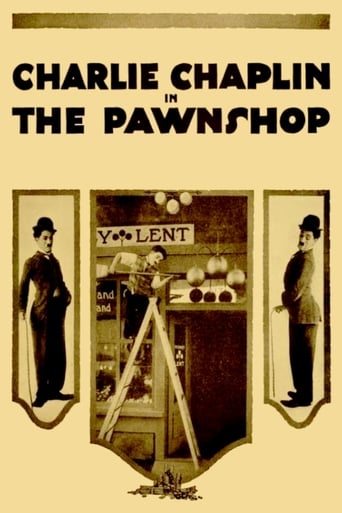TheLittleSongbird
Am a big fan of Charlie Chaplin, have been for over a decade now. Many films and shorts of his are very good to masterpiece, and like many others consider him a comedy genius and one of film's most important and influential directors. From his post-Essanay period after leaving Keystone, 'Pawnshop' is not one of his very best but is one of his best early efforts and among the better short films of his. It shows a noticeable step up in quality though from his Keystone period, where he was still evolving and in the infancy of his long career, from 1914, The Essanay and Mutual periods were something of Chaplin's adolescence period where his style had been found and starting to settle. Something that can be seen in the more than worthwhile 'The Pawnshop'. The story is more discernible than usual and is never dull, but is sometimes a bit too busy and manic and flimsy in others.On the other hand, 'The Pawnshop' looks pretty good, not incredible but it was obvious that Chaplin was taking more time with his work and not churning out countless shorts in the same year of very variable success like he did with Keystone. Appreciate the importance of his Keystone period and there is some good stuff he did there, but the more mature and careful quality seen here and later on is obvious.While not one of his most hilarious or touching, 'The Pawnshop' is still very funny with some clever, entertaining and well-timed slapstick, didn't mind that the pathos wasn't there as it was not the right kind of story. It moves quickly and there is no dullness in sight. The clock scene is one of the most uproariously funny and best scenes of any of Charlie early career output.Chaplin directs more than competently, if not quite cinematic genius standard yet. He also, as usual, gives an amusing and expressive performance and at clear ease with the physicality of the role. The supporting cast acquit themselves well, particularly the charming regular leading lady Edna Purviance.Overall, very enjoyable. 8/10 Bethany Cox
Petri Pelkonen
Charlie Chaplin shows, once again, his great slapstick skills as a pawnshop assistant.The movie is The Pawnshop from 1916.It's his 6th film for Mutual Film Corporation.Henry Bergman portrays Pawnbroker.Edna Purviance is His daughter.John Rand plays Pawnshop Assistant.Albert Austin is Client with clock.Wesley Ruggles is Client with ring.Eric Campbell portrays Thief.One of the funniest and most memorable scenes is where a client brings an alarm clock and Chaplin breaks it and says it is not acceptable.And there are many other funny scenes like that.Chaplin was a true genius of slapstick comedy.You have to see this film
wadetaylor
This is definitely one of Chaplin's top 5 or 6 shorts. The part with Albert Austin and the clock is just so hilarious, and I really like the end of that bit where the drunk gets pushed down, just because it makes no sense. I think this is the exact point in Chaplin's oeuvre in which he matured to the point in which he could make masterpieces. Don't get me wrong I like many of his earlier shorts, but everything he did from this point on could be argued as a masterpiece of comic cinema.It is true that there isn't a great amount of pathos in this one, but I like the fact that there a just so many ridiculous situations that come one after the other. A+ grade.
nelsonjcole
I saw this with a friend at a screening with a live ragtime orchestra (Paragon Ragtime Orchestra?). It was excellent. A good print and good music (not always easy to find in silent movie reissues). Both of us probably never laughed harder; I was actually worried at one point that I was going to hurt myself. While dedicated Buster Keaton fans, we were forced to admit that Chaplin was an equal, at least. Try to find a decent print and appropriate scoring. It should look good and play at normal speed, not fast, which only happens during a poor transfer of these public domain films (I think the old silents were made at 18 frames a second, and playing them on today's 24 fps speeds them up). Awesome to think that one of the earliest pioneers in film has not been surpassed--or even equaled.


